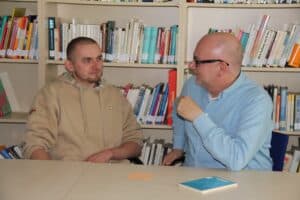Physical illnesses and mental stress often go hand in hand. Gay and bisexual men in particular are often subject to social pressure to conform to what is considered normal. For many, it is a challenge to be able to live their lives and their sexuality openly without feeling that they have to justify themselves or completely disguise themselves in front of certain groups of people.
What impact does this pressure have on the mental health of gay and bisexual men? If you wanted to make reliable statements about this, you could usually only fall back on international studies.
Psychology student Martin Kruspe has been doing a research internship at Deutsche AIDS-Hilfe for several months. For his master's thesis, he has developed a questionnaire to provide information about the "gay health" of men in Germany.
In the interview, the gay officer of the German AIDS service organisation Dr Dirk Sander and Martin Kruspe on their expectations and the importance of such a study.
What about mental health?
The study aims to find answers.
What exactly is "gay health"? Are gay men healthy in a different way or do they need different precautions?
SanderGay and bisexual men are initially exposed to the same health risks as heterosexuals. However, there may be additional health risks resulting from the confrontation with homonegative attitudes in society.
What do these burdens look like?
Sander: How openly can I live my sexual identity in society? Do I have to hide certain facets of my personality in my family, at school or at work, for example? On an individual level, this can result in stress that can make you ill. Many doctors are not even sensitised to these problems. In a study, most of the doctors surveyed stated that they did not even think about it.
Martin, how is it that you, as a heterosexual man, are dealing with this particular issue?
Kruspe: Why not? When the opportunity arose to do a research internship for my Master's thesis at Deutsche AIDS-Hilfe, I didn't hesitate for long. And whether I'm gay or straight shouldn't play a role in a scientific approach. In my psychology studies, I learnt one thing above all: you don't get far with one-sided views.
What do you hope to gain from the study?
Kruspe: During my preparatory work for this study, I noticed that many international publications on the subject are very generalised. Very one-dimensional conclusions are drawn. Of course, we want to do better. That is our incentive. There are no comparable studies in Germany either. We are really doing something special here.
And what happens to the study afterwards?
SanderI hope that we will learn a lot about the needs of gay and bisexual men. This will then also be important for the work of Deutsche AIDS-Hilfe. We will have the first results in late summer. However, we assume that the results will have a much longer-term impact. Everyone who takes part in the survey will help us to make our work even better and more targeted.
Kruspe: I also believe that we will end up with important and interesting results. I hope that many people will take part in the study so that we can achieve a good result! In any case, I look forward to everyone completing the questionnaire and thus supporting me in my work.
Interview: Tim Schomann










